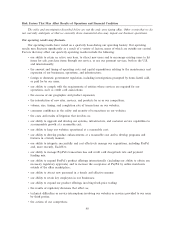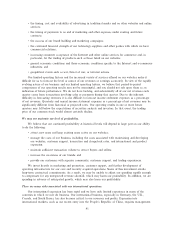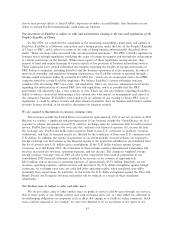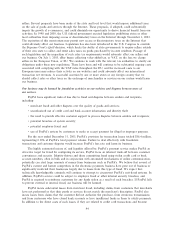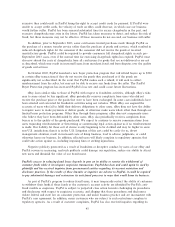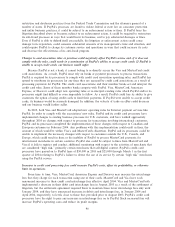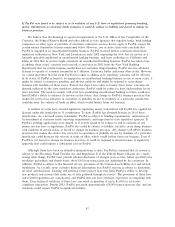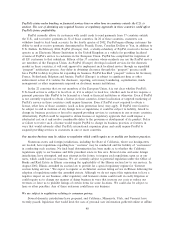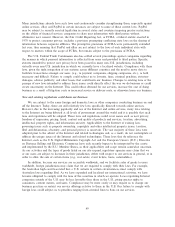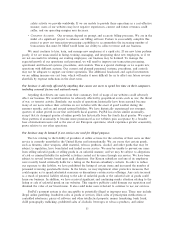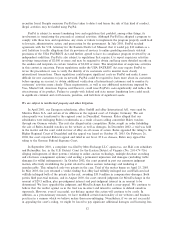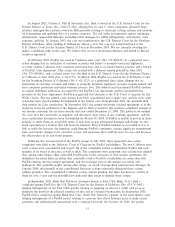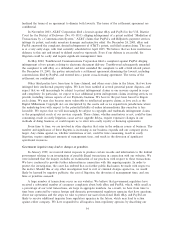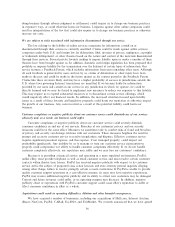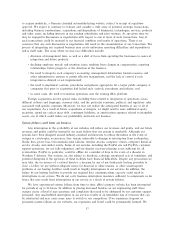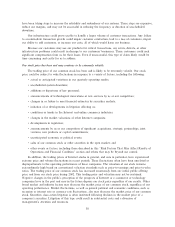eBay 2003 Annual Report Download - page 50
Download and view the complete annual report
Please find page 50 of the 2003 eBay annual report below. You can navigate through the pages in the report by either clicking on the pages listed below, or by using the keyword search tool below to find specific information within the annual report.PayPal's status under banking or Ñnancial services laws or other laws in countries outside the U.S. is
unclear. The cost of obtaining any required licenses or regulatory approvals in these countries could aÅect
PayPal's future proÑtability.
PayPal currently allows its customers with credit cards to send payments from 37 countries outside
the U.S., and to receive payments in 32 of those countries. In 22 of these countries, customers can
withdraw funds to local bank accounts. In the fourth quarter of 2002, PayPal began oÅering customers the
ability to send or receive payments denominated in Pounds, Euros, Canadian Dollars or Yen, in addition to
U.S. Dollars. In February 2004, PayPal (Europe) Ltd., a wholly-subsidiary of PayPal, received a license to
operate as an Electronic Money Institution in the United Kingdom as a vehicle for providing localized
versions of PayPal's service to customers in the European Union. PayPal has completed the migration of
all EU customers to that subsidiary. Fifteen of the 37 countries whose residents can use the PayPal service
are members of the European Union. As PayPal (Europe) develops localized services for the domestic
market in these countries, it will seek approval to implement such localized service through an expedited
""passport'' notiÑcation process. Any delay in obtaining clearance through the ""passport'' process could
force PayPal to delay its plans for expanding its business. PayPal has Ñled ""passport'' notices for Germany,
France, Netherlands, Belgium and Austria. PayPal (Europe) is subject to signiÑcant Ñnes or other
enforcement action if it violates the disclosure, reporting, anti money laundering, capitalization, funds
management or other requirements imposed on electronic money institutions.
In the 22 countries that are not members of the European Union, it is not clear whether PayPal's
U.S.-based service is subject to local law or, if it is subject to local law, whether such local law requires a
payment processor like PayPal to be licensed as a bank or Ñnancial institution or otherwise. Even if PayPal
is not currently required to obtain a license in those countries, future localization or targeted marketing of
PayPal's service in those countries could require licensure. Even if PayPal is not required to obtain a
license, other laws of those countries (such as data protection laws) may apply. If PayPal were found to
be subject to and in violation of any foreign laws or regulations, it could be subject to liability, forced to
change its business practices or forced to suspend providing services to customers in one or more countries.
Alternatively, PayPal could be required to obtain licenses or regulatory approvals that could impose a
substantial cost on it and involve considerable delay to the provision or development of its product. Delay
or failure to receive such a license would require PayPal to change its business practices or features in
ways that would adversely aÅect PayPal's international expansion plans and could require PayPal to
suspend providing services to customers in one or more countries.
Our auction business may be subject to regulation which could require us to modify our business practices.
Numerous states and foreign jurisdictions, including the State of California, where our headquarters
are located, have regulations regarding how ""auctions'' may be conducted and the liability of ""auctioneers''
in conducting such auctions. No Ñnal legal determination has been made as to whether the California
regulations apply to our business and little precedent exists in this area. Several states and some foreign
jurisdictions have attempted, and may attempt in the future, to impose such regulations upon us or our
users, which could harm our business. We are currently subject to potential regulation under the OÇce of
Banks and Real Estate in Illinois concerning the applicability of the Illinois auction law to our services. In
August 2002, Illinois amended its auction law to provide for a special regulatory regime for ""Internet
auction listing services.'' We expect to register as an Internet auction listing service in Illinois following the
adoption of regulations under the amended statute. Although we do not expect this registration to have a
negative impact on our business, other regulatory and licensure claims could result in costly litigation or
could require us to change our manner of doing business in ways that increase our costs or reduce our
revenues or force us to prohibit listings of certain items for some locations. We could also be subject to
Ñnes or other penalties. Any of these outcomes could harm our business.
We are subject to regulations relating to consumer privacy.
Several domestic jurisdictions have proposed, and California, Minnesota, Utah, and Vermont have
recently passed, legislation that would limit the uses of personal user information gathered online or oÉine.
48




